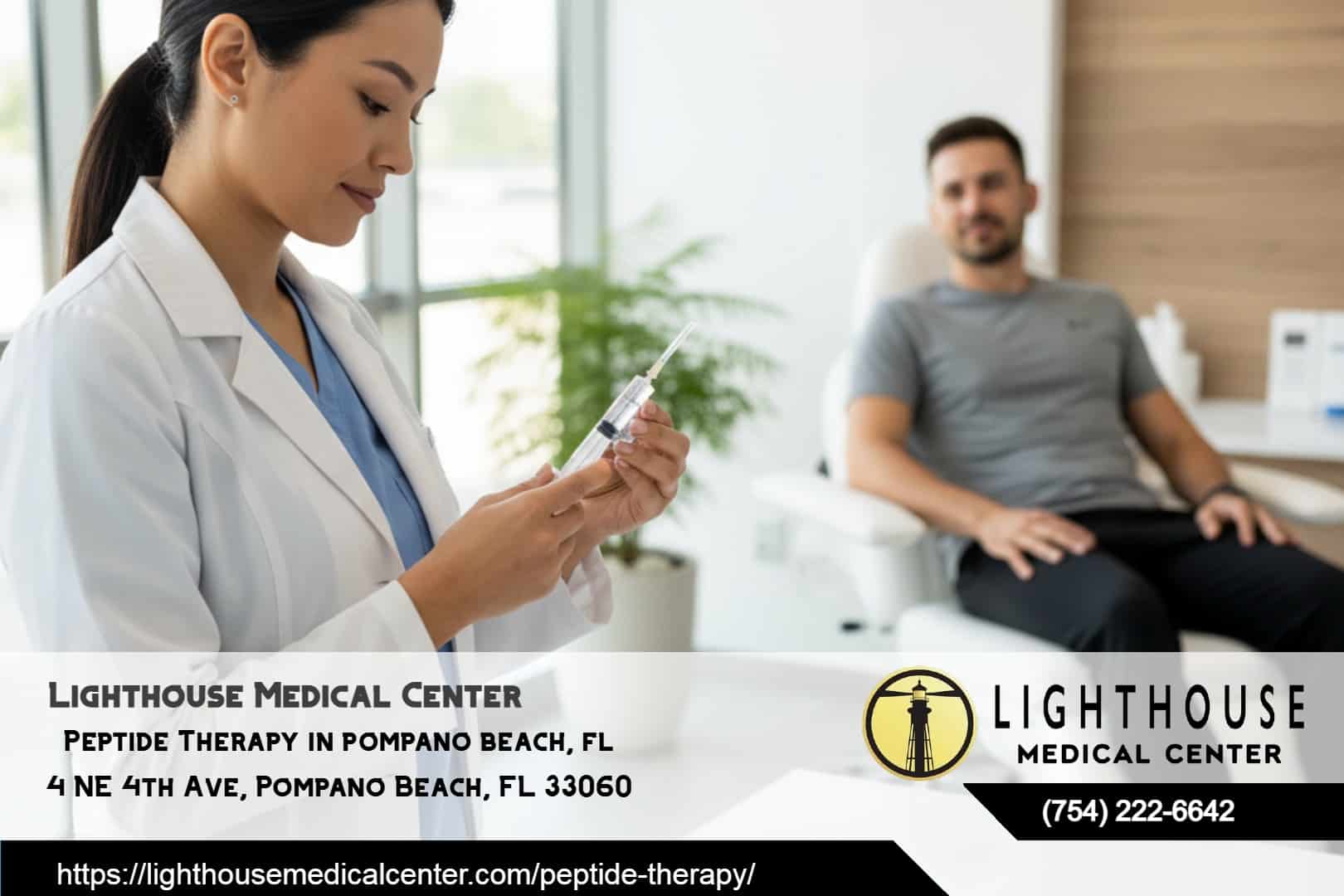Peptide Administration Methods and Treatment Protocols
At Lighthouse Medical Center, our medical team offers several peptide administration options that can be incorporated into personalized wellness protocols. The method selected depends on the specific peptide, the wellness goals being pursued, and individual preferences for comfort and convenience.
Injection Therapy
Subcutaneous and intramuscular injections are commonly used in medically supervised settings to deliver peptides directly into the body. This approach is often chosen when precise dosing and consistent absorption are important for supporting targeted wellness goals.
Oral Administration
Specially prepared capsules can be used for certain peptides that are formulated to better withstand the digestive environment. This route is often selected for patients who prefer a more traditional, pill-based option, or when broader wellness plans already focus on gut health and digestion.
Topical Applications
Creams and gels allow certain peptides to be applied directly to the skin. These formulations are frequently used in cosmetic and aesthetic wellness programs, particularly those focused on skin appearance, texture, and hair restoration therapy.
Nasal Spray Delivery
Intranasal peptide sprays offer a convenient, non-injectable option for specific compounds. This route is sometimes used when a quick, easy-to-use method is preferred and when a peptide is well-suited for absorption through the nasal passages.
Safety Considerations and Quality Assurance
At Lighthouse Medical Center, patient safety and quality are top priorities in any peptide-inclusive wellness program. our medical team utilizes pharmaceutical-grade peptides from certified compounding pharmacies and follows strict protocols intended to support product quality and consistency.
Before recommending any peptide-based option, the team conducts a thorough evaluation, which may include:
This process helps identify potential risks, guides whether peptides are appropriate within a wellness plan, and supports the development of personalized protocols.
Ongoing follow-up allows the team to monitor how patients are responding, make any necessary adjustments, and provide education on proper handling, storage, and administration techniques to help maximize safety and effectiveness within the wellness context.
Current Research and Future Directions
Peptides are a growing area of interest in scientific and medical research. Emerging studies continue to explore how different peptides may support various aspects of health and physiology, including areas such as cardiovascular wellness, brain health, immune balance, and metabolic function.
Some research is investigating peptides in the context of complex conditions—such as neuropathy or cardiovascular concerns—by looking at how they might influence cellular communication, protein folding, inflammation, or vascular function. These studies are ongoing and are part of a broader scientific effort to better understand how peptides may be used in the future.
At Lighthouse Medical Center, Dr. Don Pham stays informed about developments in peptide science so he can have up-to-date conversations with patients about how peptide-based options may fit into comprehensive, personalized wellness and optimization strategies. These offerings are positioned as supportive tools within a wellness framework, not as cures or stand-alone treatments for specific diseases.
Frequently Asked Questions
What can peptide-based wellness programs be used for?
Peptides at Lighthouse Medical Center are typically used as part of broader programs focused on goals such as weight management support, healthy aging and appearance, performance and recovery, immune balance, and overall wellness optimization. Dr. Don Pham evaluates each person individually to see whether peptide-based options make sense as part of their supervised wellness plan. These programs are not intended to diagnose, treat, cure, or prevent any disease.
How long does it take to notice changes?
Experiences vary widely. Some people feel shifts—such as changes in energy, recovery, or general well-being—within a few weeks, while others notice more gradual changes over several months of consistent use as part of a structured plan. Timelines depend on the peptide(s) used, lifestyle factors, and the specific wellness goals being pursued.
Are there side effects with peptide use?
Any wellness intervention can carry potential risks or side effects, and peptides are no exception. Some individuals may notice mild injection-site discomfort, temporary fatigue, or other transient changes as the body adapts. During your consultation, Dr. Pham will review potential risks and benefits with you and monitor your response over time.
How are peptides different from traditional hormone replacement therapy?
In many cases, peptides are used to support hormone replacement services or signal the body’s own hormone pathways rather than replacing hormones directly. Hormone replacement therapy typically involves providing bioidentical or synthetic hormones themselves. Peptides are more often discussed as signaling molecules that may help the body regulate its own processes within a supervised wellness plan.
Is peptide-based care covered by insurance?
Insurance coverage for peptide-related services varies and may be limited, depending on the specific peptide, indication, and plan. The Lighthouse Medical Center team can help you review your options and discuss payment or financing alternatives if needed.
How long do I need to stay on a peptide protocol?
Duration depends on your goals, your response, and the type of peptide being used. Some individuals pursue shorter-term protocols tied to a specific objective (such as a performance or body-composition goal), while others choose longer-term maintenance under medical supervision as part of their ongoing wellness strategy.
Can peptides be used alongside other treatments?
Yes, peptide-based options are often combined with other wellness and medical services—such as lifestyle coaching, nutrition support, hormone optimization, regenerative procedures, and more. Dr. Don Pham coordinates care to help ensure that any peptide-inclusive plan fits safely and logically into your overall health strategy.
What makes Lighthouse Medical Center different for peptide-based wellness?
Lighthouse Medical Center offers personalized, medically supervised programs that may include peptides as one component of a larger wellness and optimization plan. Under the guidance of Dr. Don Pham, patients receive:
-
Pharmaceutical-grade compounds from trusted sources
-
Comprehensive evaluation and lab review when appropriate
-
Clear guidance on use, expectations, and safety
-
Ongoing monitoring and adjustments tailored to their goals
All peptide-based services are positioned as supportive wellness tools—not as substitutes for primary medical care or as treatments for specific diseases.
Contact Lighthouse Medical Center
Lighthouse Medical Center 4 NE 4th Ave Pompano Beach, FL 33060 Phone: (754) 222-6642
Service Areas: Pompano Beach, FL and Broward County
Office Hours: Monday - Friday: 9:00 AM - 5:00 PM Saturday: By appointment Sunday: Closed







